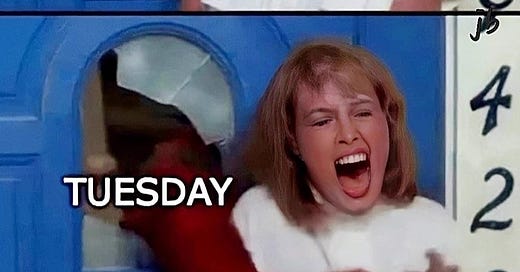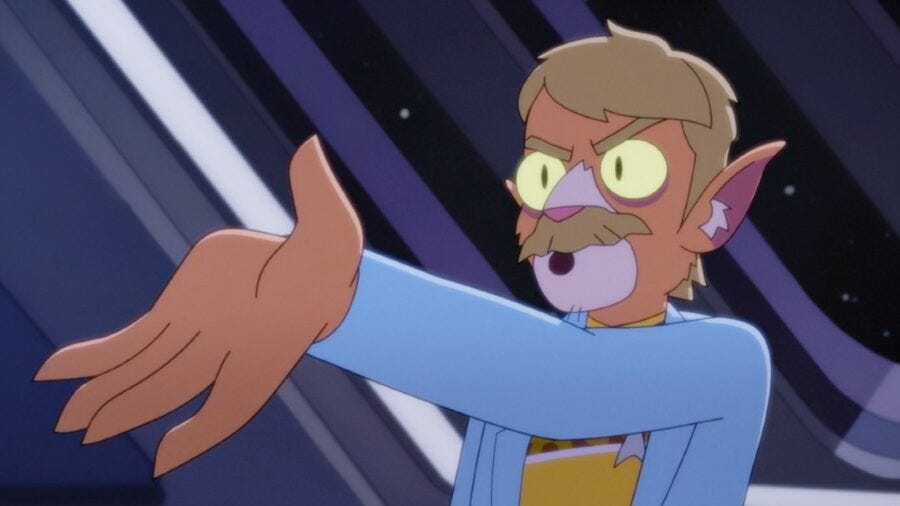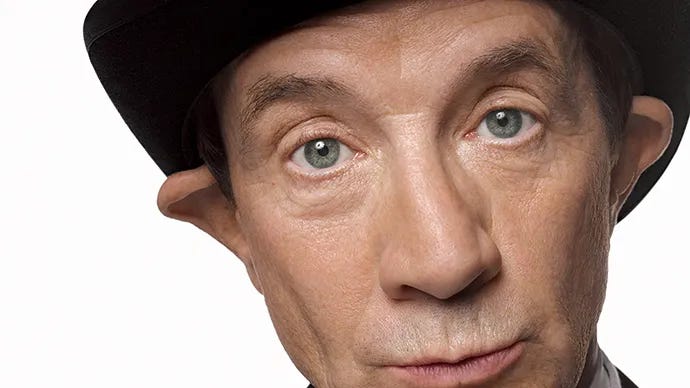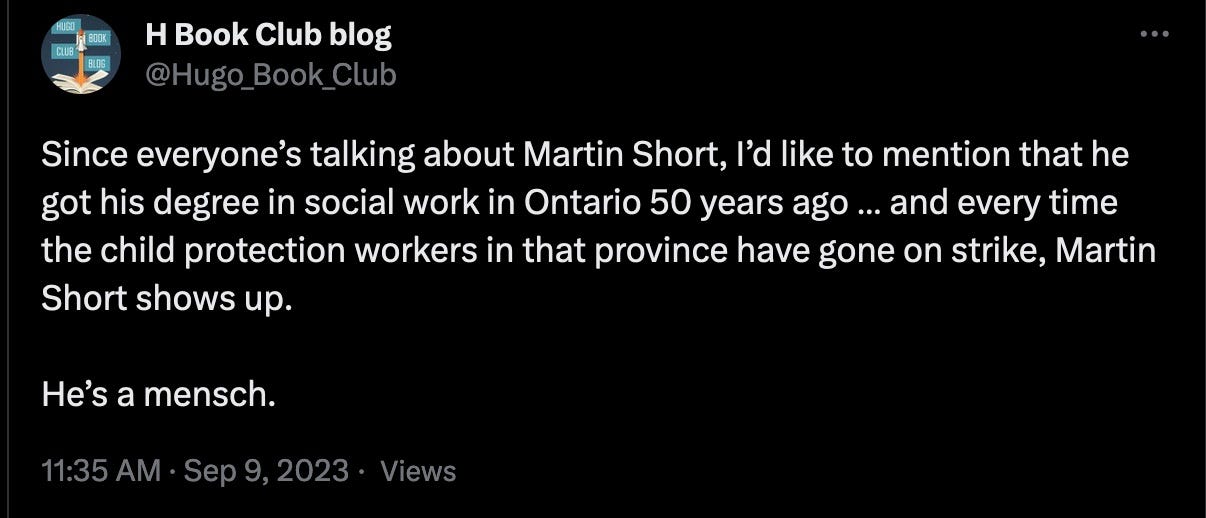EPISODE 828: NOBODY PUTS MARTIN SHORT IN A CORNER (EXCEPT FOR STEVE MARTIN)
Wait for the Rim Shot
POP CULTURE SPIRIT WOW
Hi and welcome to Pop Culture Spirit Wow, the newsletter with has a title that sounds like a podcast, written by a guy who sounds like he was raised on polish sausage. (You can take the boy out of Chicago…)
I hope you survived Labor Day weekend. Thanks to friend of the Wow and hero of the people Rob Kotecki for once again finding the meme to express my own experience. For a “short week” last week felt like the sinking of the Titanic. (At one point I randomly said to a friend, for no apparent reason, “I think I may be doomed.”)
But here we are, almost halfway through September. Let’s get into it.
THE WOWND UP
This week Star Trek’s fun animated series Lower Decks returned with an episode hearkening back to the Star Trek: Voyager episode in which Tuvok and Neelix were merged in a transporter accident into a new person—who then begged not to be re-divided (but were)—and now I can’t stop thinking about whether it’s wrong to erase the life that emerges from a teleporter accident in favor of the previous two, despite the fact that none of this is real.
In Hollywood the writers strike has now been going four months and the actors strike two months. There will be no fall scripted television on the networks, and I wouldn’t expect to see a heck of a lot on the streamers, either. (Thank God Taskmaster is on YouTube!) In those four months the studio executives have come to the table just once, a few weeks ago, in a stunt staged to try and undermine the WGA’s leaders credibility within their rank and file. I had the chance to talk to Mike Farah, the CEO of Funny Or Die about the strikes recently. He had a lot of interesting things to say, both about the dire future of the streaming services and about how moving forward really requires everyone to look to the long term and “choose community.”
Finally, as I approach the end of my reread of the Harry Potter series, I have come to three conclusions: 1) Harry Potter is a lot more emo than we generally remember; 2) It is very weird to read a story about a school full of kids today that has no queer characters or people of color; and 3) I really wish someone would write a series about one of the other houses at Hogwarts.
DEAR SLATE, MARTIN SHORT WOULD LIKE A WORD
On Friday Slate’s Dan Kois did a piece on Martin Short, saying he’s a desperate, unfunny hack (in pretty much those words).
It’s fair to say that this is not proving to be a popular opinion.
Writers voicing unpopular opinions is often the name of the game, not just in terms of clicks but integrity. The point of being a pop culture writer is to give people something new to think about.
At the same time, slamming a performer out of the blue kinda sucks Especially when the piece doesn’t seem terribly interested in being fair. Martin and Short are delivering some of the greatest performances of their career in Only Murders in the Building—funny, but also unexpectedly heartfelt and poignant. But Kois gives that show—which by the way is the entire reason that a piece about Short is getting published right now in the first place—just one paragraph, at the end. It ain’t right.
Kois’ argument is that Short’s comedy comes from a desperate need for attention. But after reading the article I started rewatching a lot of his sketches. And what I found was someone hungry to be bold and also to delight.
And so for the heart of the Wow tonight, here’s some highlights and thoughts from five of Short’s most iconic creations. Enjoy!
Ed Grimley
Ed Grimley is Short’s most famous character, the ultra-nervous, constantly-dancing guy with pointy hair who “must say” and has his pants up to his armpits. The character is weird and manic, like an insane love child of Pee Wee Herman and Our Gang’s Alfalfa.
But unlike a lot of Short’s characters, he is also sweetness personified. Grimley’s whole schtick is simply that he’s really excited about an opportunity—a job, a slot on Wheel of Fortune—and can’t stop thinking about how amazing it would be to get it.
Which is enormously endearing. He’s almost like a silent film character, in that way. His heart is right there on his sleeve. And think he’s meant to offer a glimpse into ourselves. As weird as he seems, here’s something very human about Ed Grimley.
Peak Grimley is the triangle solo dance, which became a whole thing as soon as he did it. Tell me it’s not a dance that expresses the silliness and joy of being alive.
Jiminy Glick
Short’s fatuous celebrity interviewer Jiminy Glick presents like a parody of celebrity reporting. But what’s actually central to the greatest episodes, like the Julia Louis-Dreyfus one above, is Short’s desire to make the people he’s interviewing laugh. Everything he does, from the sudden changes of his voice to his questions out of left field (like asking Louis-Dreyfus how the births of her children went), is very clearly done to mess with them.
Watch what he does to Mel Brooks about 1:33 minutes in here as he asks about Brooks’ work as a jazz drummer.
That’s Mel Brooks, the king of comedy, and Short just wipes the floor with him.
Or in this interview with Nathan Lane, watch how Lane at first tries to serve comedy back at Short, only to find himself in the end literally laughing so hard he starts crying.
I don’t know why it is, but seeing an actor break is never not delightful.
Nathan Thurm
Nathan Thurm is Short’s sweaty, cigarette smoking guy who constantly insists that other people are wrong or at fault only to suddenly reverse and deny he ever said that. He’s like something right out of the Nixon administration.
Part of what makes the sketch genius is the way it reverses the approach The Daily Show made a standard of comic news. Instead of playing the reporter showing how stupid our politicians are, Short puts himself in the position of the political representative being questioned.
The greatest example of Thurm may be him being interrogated by Robert Kennedy, Jr. about the environmental crisis.
One of the things I find really striking about his performance here is the way it foreshadows the tactics of the Bush and Trump Adminstrations. So at one point Kennedy says, “England’s top scientist says that global warming plays a greater threat to global security and to international stability than terrorism.” Thurm immediately shoots back, “Well he would say that, he’s a scientist.” Cut to: 2020.
Thurm’s move is always to deny, then deny you denied and use that to attack them. It’s like a precis of the modern Republican playbook. And Short created it in 1984.
Steve Martin’s Nemesis
One of Short’s best roles, actually, is him playing a narcissistic version of himself who loves to ridicule Steve Martin.
At the AFI award ceremony honoring Martin above, Short is fearless. “Steve Martin has told me that one of his fondest memories was strolling through Disneyland with Uncle Walt,” Short says of Martin’s first job doing magic tricks at Disneyland. “And playing Walt’s favorite game of ‘Jew or not a Jew.’”
“One time I asked Steve,” Short said, “’What would you be doing if you weren’t a talented comedic actor?’ And he said, ‘Probably what you’re doing.’”
It’s a version, really, of the character he’s playing on Only Murders, and he’s very good in it. There’s not a trace of the mannered performances that Kois associates with Short.
Short is great at roasting others, too. This story of him meeting Lucille Ball is one of the devastating takes on her you’ll ever hear. And in a classic Short twist, it ends with him blaming himself for everything that she did.
Jackie Rogers, Jr.
Jackie Rogers, Jr. is one of Short’s craziest characters—a cross-eyed, albino aging rock star with an insane haircut. The role, which stands in a long line of SNL lounge singer characters who are buffoons, gives Short the chance to do some of his signature stuff, particularly big dance moves.
But he’s a harder character to get into, in part because there’s so much going on with Jackie. But also, where a lot of SNL’s fool characters actually charm us because they’re so stupid, Rogers is really not endearing at all.
In a way that makes the character distinctive and worth mentioning. Short certainly is capable of making you fall head over heels in love with his creations. But he chooses here to go for something harder and weirder. For me it doesn’t really land, but his daring is obvious. He’s trying to take something familiar and do something original with it.
It’s a short Wow this week. (heh heh heh.) Hope you enjoyed it, and also the interview with Eric Orner I posted Friday. We had such a great conversation.
If you’d like to toss me a couple shekels for a coffee, my paypal is paypal.me/jimmcdsj. My Venmo is:
Thanks as always for your kind support.
MESSAGE IN A BOTTLE
If you need a pick me up this week, try this clip of Jiminy Glick interviewing Anderson Cooper.
Anderson Cooper giggling is truly one of the greatest things you’ll ever see. And nobody makes it like happen like Jiminy Glick.











"Kois’ argument is that Short’s comedy comes from a desperate need for attention." This is generational. Performers exerting any kind of effort to amuse people went out of fashion when audience laughter was virtually banned from television.